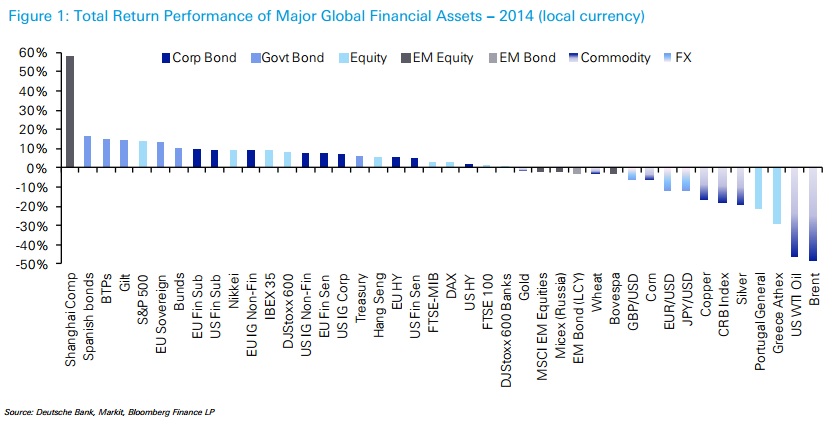A strong rally from the Chinese equity market helped it take top slot as the best-performing investment in 2014.
In a research note from Deutsche Bank, China’s Shanghai Composite index was shown to have gained 58% over the course of the year in dollar terms, largely due to double-digit gains in November and December.
Spanish, Italian, and UK government bonds all posted returns of 15% to 16% for 2014, outperforming the S&P 500’s 14% gain despite the benchmark hitting record highs during the year. Jim Reid, strategist at Deutsche Bank, said the performance of peripheral European bonds was driven largely by the prospect of the ECB introducing quantitative easing in 2015.
Oil and other commodities were among the worst investments in 2014, with the price of Brent crude oil collapsing 48% during 2014.
 Looking ahead, Reid highlighted Greece as an important issue
for investors at the start of the year. With a general election at the end of
January, German newspaper reports have suggested that Greece is very likely to
exit the Eurozone if the left wing Syriza party gains power, Reid
wrote—although the German government has said it wants Greece to remain part of
the currency bloc.
Looking ahead, Reid highlighted Greece as an important issue
for investors at the start of the year. With a general election at the end of
January, German newspaper reports have suggested that Greece is very likely to
exit the Eurozone if the left wing Syriza party gains power, Reid
wrote—although the German government has said it wants Greece to remain part of
the currency bloc.
While German Chancellor Angela Merkel has stated that the Eurozone can cope with a Greek exit, Reid’s colleague George Saravelos, analyst, warned of “significant political and financial uncertainty” ahead of the election and a looming deadline for Greece’s current financing programme, which expires at the end of February.
Related Content:‘Good Chance’ of QE in Europe to Prevent Deflation, Says PIMCO & The Year That Wasn’t
